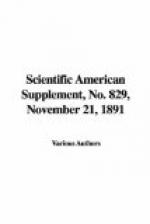Another danger sometimes follows which is remote, but may be fatal, even to persons who are in health. It is one of the best known facts in science that when a part of the surface of the body has been exposed long to cold, the greatest risk is run in trying suddenly to warm it. The vessels become rapidly dilated, their coats relax, and extreme congestion follows. But what is true of the skin is true equally, and with more practical force, of the lungs. A man, a little below par, goes out when the wave of temperature is low, and feels oppressed, cold, weak, and miserable; the circulation through his lungs has been suppressed, and he is not duly oxidizing; he returns to a warm place, he rushes to the fire, breathes eagerly and long the heated air, and adds to the warmth by taking perchance a cup of stimulant; then he goes to bed and wakes in a few hours with what is called pneumonia, or with bronchitis, or with both diseases. What has happened? The simple physical fact of reaction under too sudden an exposure to heat after exposure to cold. The capillaries of the lungs have become engorged, and the circulation static, so that there must be reaction of heat, inflammation, before recovery can occur. Nearly all bronchial affections are induced in this manner, not always nor necessarily in the acute form, but more frequently by slow degrees, by repetition and repetition of the evil. Colds are often taken in this same way, from the exposed mucous surfaces of the nose and throat being subjected first to a chill, then to heat.
The wave of low temperature affecting a mixed population finds inevitably a certain number of persons of all ages and conditions on whom to exert its power. It catches them too often when they least expect it. An aged man, with sluggish heart, goes to bed and reclines to sleep in a temperature, say, of 50 deg. or 55 deg.. In his sleep, were it quite uninfluenced from without, his heart and his breathing would naturally decline. Gradually, as the night advances, the low wave of heat steals over the sleeper, and the air he was breathing at 55 deg. falls and falls to 40 deg., or it may be to 35 deg. or 30 deg.. What may naturally follow less than a deeper sleep? Is it not natural that the sleep so profound shall stop the laboring heart? Certainly. The great narcotic never travels without fastening on some victims in this wise, removing them, imperceptibly to themselves, into sleep ending in absolute death.




